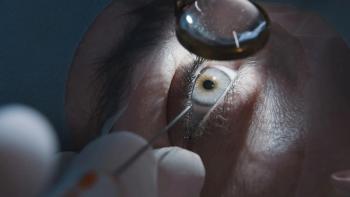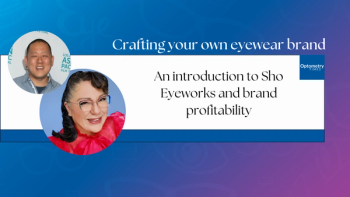
Language choice key in driving optical sales
To sell better, eye care specialists need to stop selling. While counterintuitive, this is what generates the best environment that fosters not only better sales figures, but also more trust and credibility among patients, claim Dr. Ann Hoscheit, OD, FAAO, FAARM, of Summit Eye Associates and Dr. Robert Davis, OD, of the Eye Center.
Las Vegas-To sell better, eye care specialists need to stop selling. While counterintuitive, this is what generates the best environment that fosters not only better sales figures, but also more trust and credibility among patients, claim Dr. Ann Hoscheit, OD, FAAO, FAARM, of Summit Eye Associates and Dr. Robert Davis, OD, of the Eye Center.
"Sixty-six percent of eye care is done by independent healthcare professionals, but those same professionals only fulfill 44 percent of related prescriptions," said Dr. Davis. "Where's the disconnect?"
"The paradigm shift begins with the prescription phase itself," he said. The problem lies in the way optometrists discuss prescriptions. In most other healthcare professions, doctors simply discuss what the best option is for the patient's situation, and then prescribe it. But in eye care, doctors tend to make the mistake of discussing multiple options, sometimes even getting into pricing discussions.
Instead, optometrists should discuss what's best for the patient and not prejudge what value the best solution will have for the patient. That's for the patient to decide later when discussing the solutions offered with an optician.
"
This small change was but one of the insider tips Dr. Hoscheit and Dr. Davis provided at the conference. Another important change was language use. Rather than discussing things in negative or neutral language, usage of positive wording helped paint a picture that resonated better with patients. Rather than telling a patient his or her insurance would "only" cover a certain percentage of the lens cost, Dr. Davis recommends
Furthermore, it's important to also use language patients can intuitively understand. While AR, PD, seg height, polycarb, and other industry jargon tell industry insiders all they need to know, most patients haven't a clue what those terms mean for their day-to-day standard of living. Instead of discussing a lens's anti-reflective property, tell patients the glasses are non-glare and show them examples either via pictures or letting them try a pair out in the parking lot. Instead of polycarb, a lens is impact-resistant, and instead of being progressive, lenses provide clear vision at all distances, Dr. Davis said.
In all, the lesson to take away is that language plays a big role in how effective a practice's optics department will be in fulfilling prescriptions, the doctors agreed, rather than seeing sales slip away to online retailers.
Newsletter
Want more insights like this? Subscribe to Optometry Times and get clinical pearls and practice tips delivered straight to your inbox.













































